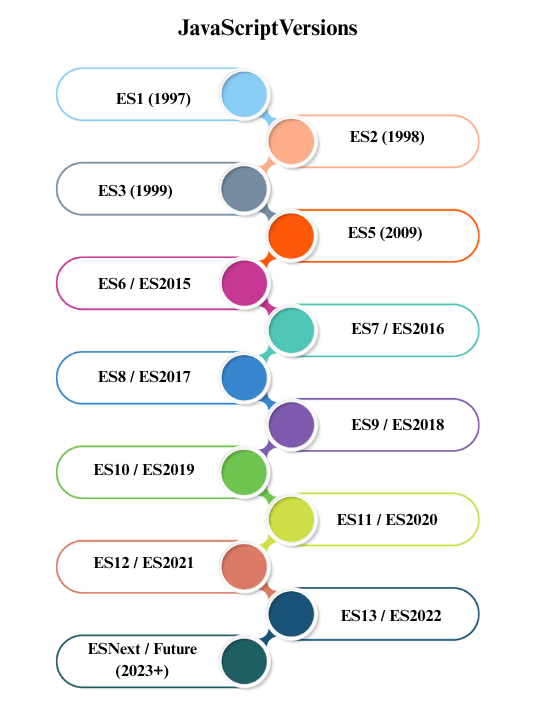JavaScript Versions & Standards: ES5 to ES2025
JavaScript has evolved over the years through ECMAScript (ES) standards, which define the language’s syntax, features, and behavior. Each version introduced new capabilities, improved performance, and enhanced error handling.

ES1 (1997)
The first official ECMAScript version.
- Introduced basic syntax, data types, loops, and functions.
- Error handling: Basic
try-catchsupport using the Error object.
Example:
try {
throw new Error("An error occurred");
} catch (e) {
console.log(e.message); // Output: An error occurred
}
ES2 (1998)
- Editorial changes to align with ISO standards.
- Error handling: Remained basic, no new features.
ES3 (1999)
- Introduced regular expressions, improved string methods, and robust error types like
TypeErrorandReferenceError. - Error handling: Added the
finallyblock for cleanup aftertry-catch.
Example:
try {
let x = y; // y is undefined
} catch (e) {
console.log(e.name); // ReferenceError
} finally {
console.log("Cleanup done");
}
ES5 (2009)
- Added strict mode to enforce safer coding practices.
- Introduced JSON support, getters/setters, and Array methods like
forEach. - Error handling: Enhanced debugging with
error.stackand better reporting of undeclared variables.
Example:
"use strict";
try {
undeclaredVar = 5; // ReferenceError in strict mode
} catch (e) {
console.log(e.stack);
}
ES6 / ES2015
Major overhaul introducing let/const, arrow functions, classes, modules, template literals, Promises, Map/Set, and Symbols.
Error handling:
- Custom error classes
- Promises allow
.catch()for async error handling
Example:
class CustomError extends Error {
constructor(message) {
super(message);
this.name = "CustomError";
}
}
const promise = Promise.reject(new CustomError("Failed"));
promise.catch(e => console.log(e.name, e.message)); // CustomError Failed
ES7 / ES2016
- Introduced Array.includes() and the exponentiation operator (
*). - Error handling: Minor changes; Promises usage grew.
Example:
let arr = [1, 2, 3];
console.log(arr.includes(2)); // true
console.log(2 ** 3); // 8
ES8 / ES2017
- Added async/await to simplify asynchronous code.
- Added Object.values(), Object.entries(), and string padding methods.
- Error handling: Async errors can now be managed cleanly with
try-catch.
Example:
async function fetchData() {
try {
const response = await fetch("<https://invalid-url>");
} catch (e) {
console.error("Fetch error:", e.message);
}
}
ES9 / ES2018
- Introduced rest/spread properties, asynchronous iteration, and regex improvements.
- Error handling: Supports
for await...ofwith propertry-catch.
Example:
async function processAsync(iterable) {
try {
for await (let item of iterable) {
console.log(item);
}
} catch (e) {
console.error(e);
}
}
ES10 / ES2019
- Added Array.flat(), Array.flatMap(), Object.fromEntries(), trimStart/End.
- Error handling: Optional catch binding allows
catch { }without specifying the error.
Example:
try {
JSON.parse("invalid");
} catch {
console.log("Parsing failed"); // No error variable needed
}
ES11 / ES2020
- Introduced BigInt, optional chaining (
?.), nullish coalescing (??), and Promise.allSettled(). - Error handling: Optional chaining reduces TypeErrors when accessing undefined properties.
Example:
let obj;
console.log(obj?.property); // undefined
ES12 / ES2021
- Added String.replaceAll(), logical assignment operators, WeakRefs.
- Error handling: Enhances memory-safe operations and reduces runtime errors.
Example:
let text = "foo bar foo";
console.log(text.replaceAll("foo", "baz")); // baz bar baz
ES13 / ES2022
- Introduced top-level await, class fields, and Error.cause.
- Error handling:
Error.causeallows linking errors to their root cause.
Example:
try {
throw new Error("Outer error", { cause: new Error("Inner error") });
} catch (e) {
console.log(e.message); // Outer error
console.log(e.cause.message); // Inner error
}
ESNext / Future (2023+)
- Ongoing yearly updates with features in proposal stages, like pattern matching, pipeline operator, etc.
- Error handling: Will evolve with new constructs and advanced async patterns.

